
7 minute read
Artificial intelligence – the Canadian connection
by nestor Arellano
ONTARIO
Advertisement
Ai is the future And these biotech firms Are poised to seize it
The writing is on the wall, in papers (peer-reviewed no doubt), and all over the Internet. Artificial Intelligence is transforming our world – right before our very eyes, in live, augmented reality colour

Canadians are not mere bystanders in what is being called the AI revolution. Many of our country’s scientists are leading the insurrectionists.
It could be argued that Ontario is ground zero for the unfolding AI upheaval. A lot of deep learning research come out of Canada. Many of today’s world leaders in AI research can also trace their roots to Ontario universities like the University of Toronto.
Three of the biotech firms engaged in some of the most exciting AI researchers have robust Canadian connections.
Winterlight lAbs
Can the way a person speaks be accurately used to detect dementia?
Researchers at Toronto’s Winterlight Labs believe so. The company is developing a proprietary AI diagnostic platform that can objectively assess and monitor cognitive health.
“Using a one-minute speech sample, our platform can analyze natural speech,” said Liam Kaufman. “It can detect and monitor dementia, aphasia and other cognitive conditions.”
Kaufman holds a master’s degree in medical science, a bachelor’s degree in psychology and another in computer science – all from the U of T. He is the CEO of Winterlight, a startup he co-founded in 2015.
The Winterlight platform analyzes hundreds of linguistic cues, according to Kaufman. Peer-reviewed studies proved the platform can detect dementia of the Alzheimer type and other conditions with accuracies between 82 per cent and 100 per cent.
The assessment can be administered with the use of a tablet device with which subjects are asked to view images on the screen, and speak out his or her description of the picture. The device records the subject’s voice, and sends the audio file over the cloud to Winterlight Lab’s analysis platform. The platform immediately uses 400 variables to quantify the speech, language, and cognition and then provides a mini mental state examination (MMSE) score.
Dementia affects more than 47.5 million people around the world, according to World Health Organization numbers. Often, the disease is not detected until its debilitating signs begin to surface. Research has shown that certain changes in speech can signal the early onset of dementia.
In an interview with U of T faculty of medicine writer Carolyn Morris, Frank Rudzicz, a scientist with the Toronto Rehabilitation Institute – an expert in acoustic processing, and co-founder Winterlight, said the technology recognizes cognitive impairment through observa-
ONTARIO
the Winterlight platform can analyze natural speech to detect and monitor dementia, aphasia and other cognitive conditions.
— liam Kaufman

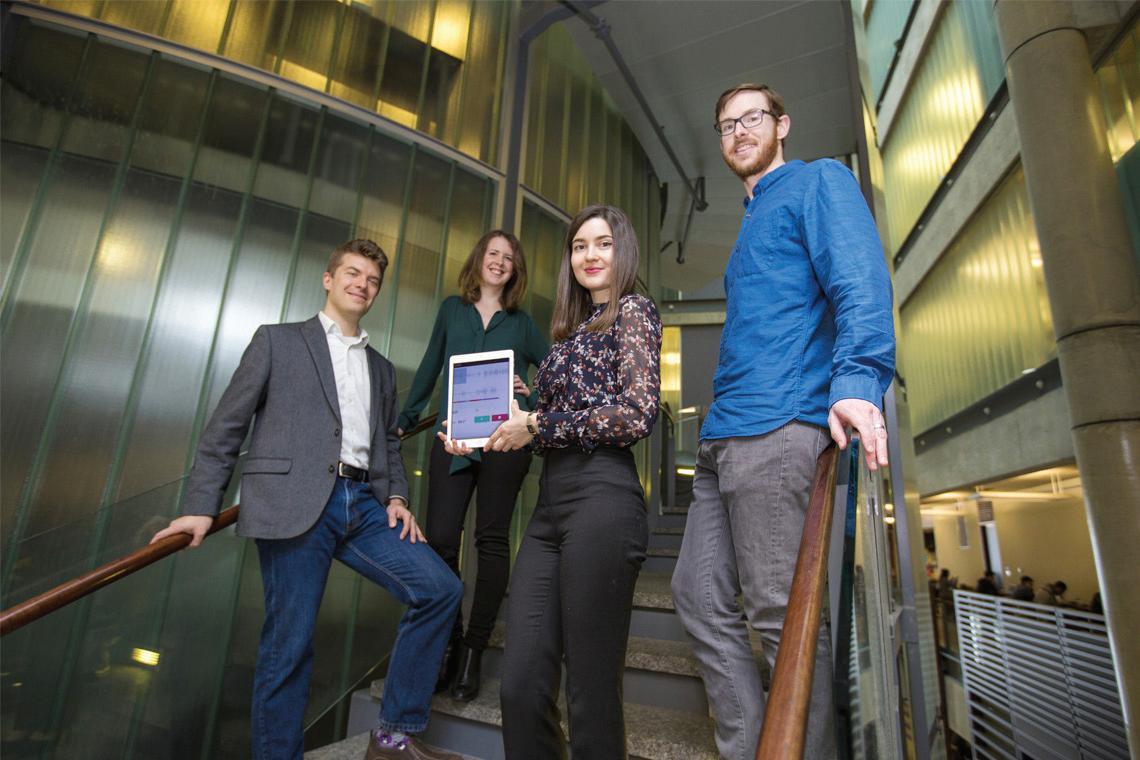
ONTARIO
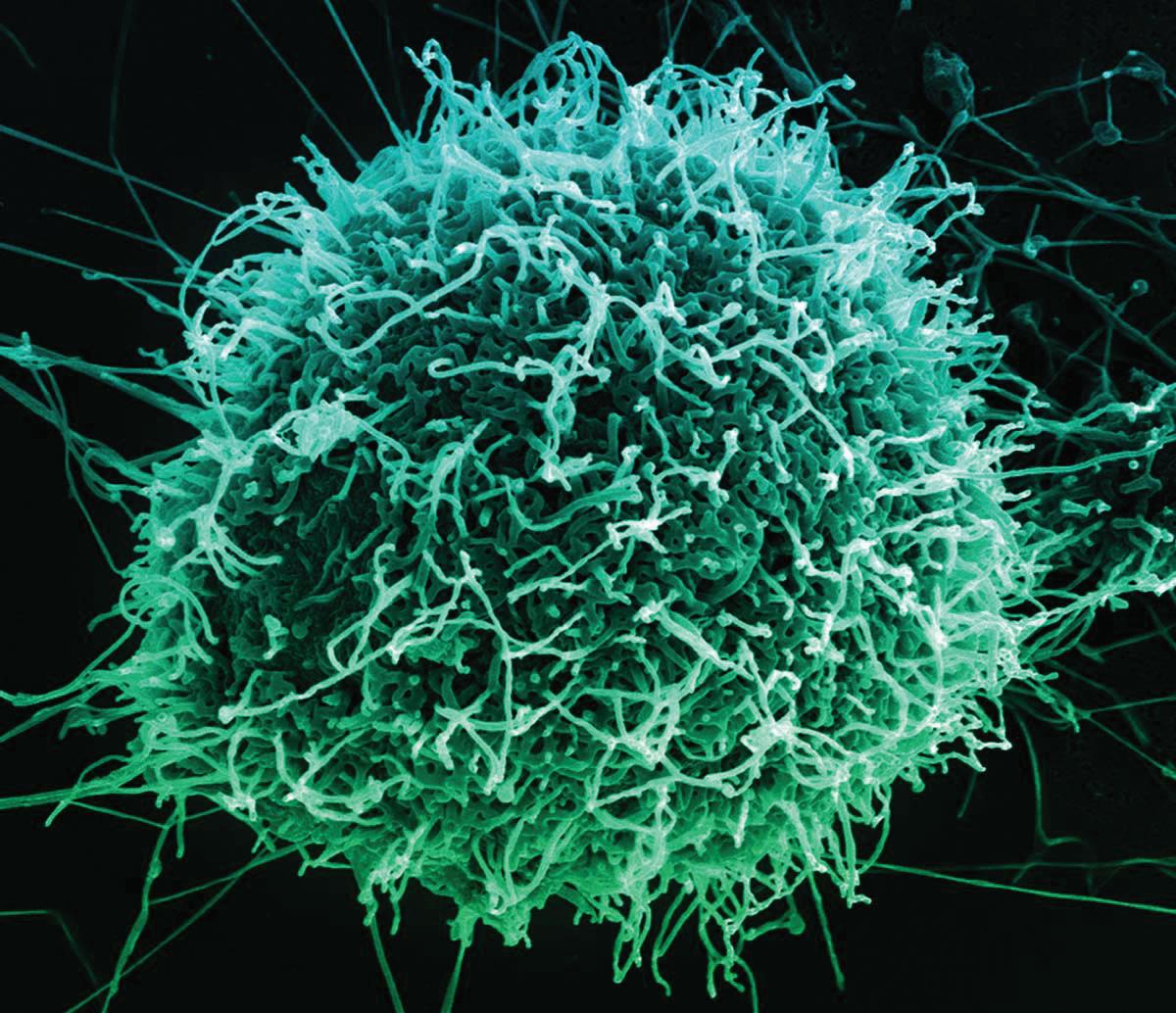
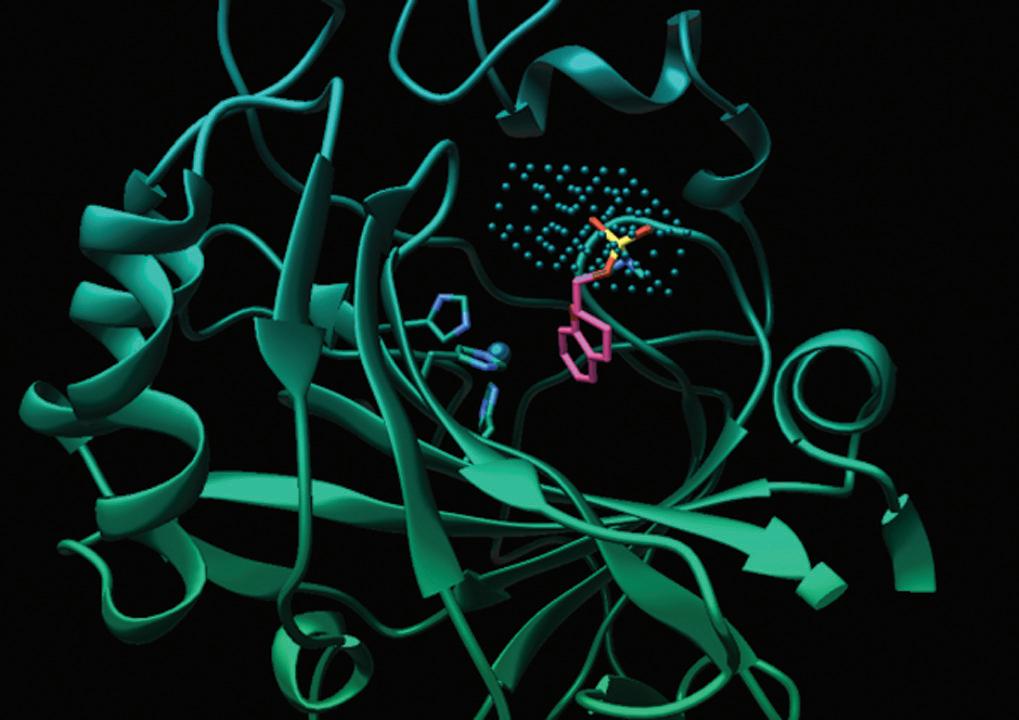
for a drug to work, it has to stick to a target protein. researchers need to find a molecule that would work with this protein. today, to do this test is physically labourius. it’s slow, expensive and difficult.
—dr. Abaraham heifets
tions of diction and syntax.
One of the signs of cognitive impairment is the use of simple verbs rather than gerunds. For example, said Rudzicz, a person with cognitive impairment might say “the kid runs” instead of “there’s a kid running” or “a kid on stool” but fail to make the connection that “the son is trying to steal cookies.”
Apart from the Winterlight team’s experience in cognitive neurology and speech technology, the platform is being powered by artificial intelligence.
“One of the areas where AI and computers are good is in solving the needle in the haystack problem,” said Kaufman. “Deep learning is a type of AI that has been particularly good in detecting and teasing out patterns and relationships, whether it’s in the pitch of a voice or image from an X-ray or CT scan.”
The platform, he said, is a huge improvement from the time-consuming, costly and subjective method of assessment which uses pencil-and-paper test.
The Winterlight team is conducting a series of pilot studies with seniors in Toronto retirement homes. They hope to develop the platform into a diagnostic tool that can be used in doctors’ offices, telemedicine, and it pharma campuses.
AtomWise
Researchers typically test tens of thousands of compounds as part of the process of developing new drugs. It is a task which could involve tests on upwards of 1,000 people. It could take up to 15 years and cost more than $1 billion.
“For a drug to work, it has to stick to a target protein. Researchers need to find a molecule that would work with this protein,” said Dr. Abaraham Heifets. “Today, to do this test is physically labourius. It’s slow, expensive and difficult.”
But simulation using AI can significantly cut down the time and cost, said Heifets, a former IBM software engineer and holder of a PhD in computer sciences from U of T. He is also co-founder and CEO of Atomwise Inc., a San Francisco-based tech startup that created AtomNet.
AtomNet is a deep learning technology for novel small molecule discovery. It takes the legwork out of the testing process. Using deep learning, the technology predicts how molecules will react and likely they are to bind with proteins.
The software can also teach itself to recognize patterns in molecular interaction.
So far, the software has been used to help create new drugs for Ebola and multiple sclerosis.
Whereas the physical trial-and-error method used by scientist to analyze tens of thousands of compounds could take up to 18 months, Heifets said, the Atomwise technology is “able to deliver compounds in as little as four to 12 weeks.”
Atomwise can screen a million compounds in one day but “the time factor is dominated by FedEx,” he lamented.
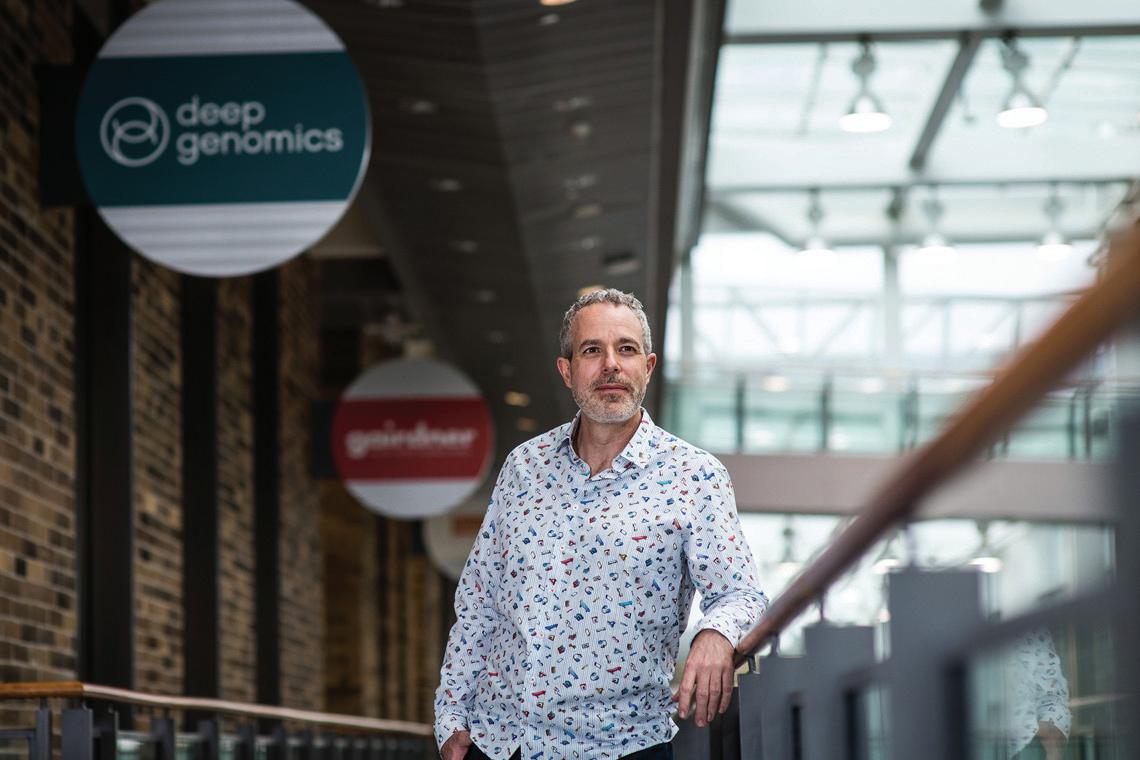
ONTARIO
— Brendan Frey
DEEP GENOMICS
Another company seeking to streamline what it calls the “guessand-test” approach to the molecule and protein matchmaking process is Deep Genomics. Like many tech and biotech startups in the city, it operates out of the MaRS Centre in downtown Toronto.
Deep Genomics is using machine learning and genomic science to develop genetic medicines and speed up treatments that address the root causes of diseases and disorders, from cancer to autism to cystic fibrosis, according to Brendan Frey.
Frey is a U of T engineering professor, as well as, co-founder and CEO of Deep Genomics. He is also co-founder of the recently launched Vector Institute. With over $200 million in funding, the Vector Institute aims to become a global hub for AI research and development.
“There are many ways a protein could be causing a problem, resulting from different changes to the genome. We can see those changes at the level of individual genes,” Frey said in a recent interview with the U of T Engineering News. “Instead of focusing on proteins, we’re focusing on the genetic mutations that are the source of the problem.”
Deep Genomics aims to harness the massive amount of genetic data gathered from the time gene sequencing began in 2011.
The startup hopes to help pharma companies cut down their drug development.
Deep Genomics’ technology was used to find ways to tackle rare Mendelian disorders, a class of genetic conditions caused by mutations in a single gene. More than 350 million people worldwide are affected by Mendelian disorders.
Deep Genomics will explore disorders of the central nervous system, eye, and liver, said Frey. The company has been using machine learning to study mutations in the genome. It’s now time for Deep Genomics to use its platform to help pharmaceutical companies create genetic medicines, he said.
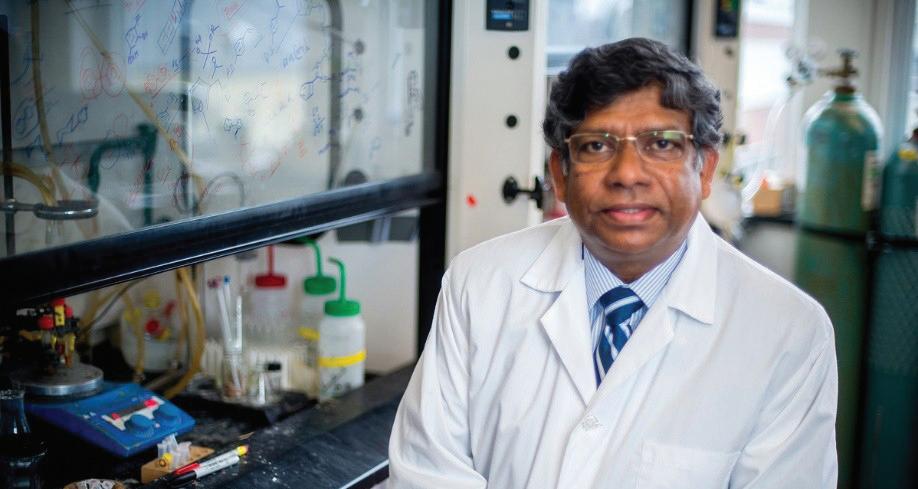
To see this story online visit http://biotechnologyfocus.ca/artificial-intelligencethe-canadian-connection/
www.kalgene.com
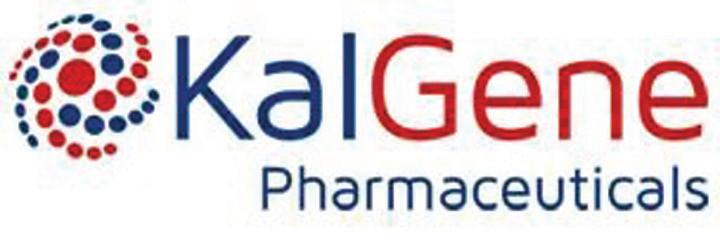
“KalGeneisdeterminedtodevelop therapeuticstotreatAlzheimer’s. ” - Dr. T. Nathan Yoganathan, CEO, KalGene Pharmaceuticals Inc.
KalGene Pharmaceuticals is developing a novel therapeutic molecule to treat Alzheimer’s disease. KalGene is collabo rating with NRC, McGill, the Montreal Neurological Institute and CIMTEC to advance the therapeutic development. KalGene plans to initiate Phase 1 clinical trials in 2018.




